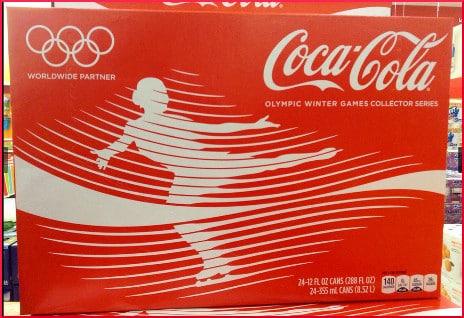 Once the 2012 Olympics in London had ended, activists started trying to ensure that the next time would be different. In Britain, some of the entities calling for the end of junk food sponsorship of sporting events are the Academy of Medical Royal Colleges, the London Assembly, the Chief Medical Officer for Wales, and the European Public Health Alliance. Their discontent was expressed by the Children’s Food Campaign, which publicly urged the International Olympic Committee (IOC) to change its ways. They wanted an end to sports sponsorship by giant food and beverage corporations.
Once the 2012 Olympics in London had ended, activists started trying to ensure that the next time would be different. In Britain, some of the entities calling for the end of junk food sponsorship of sporting events are the Academy of Medical Royal Colleges, the London Assembly, the Chief Medical Officer for Wales, and the European Public Health Alliance. Their discontent was expressed by the Children’s Food Campaign, which publicly urged the International Olympic Committee (IOC) to change its ways. They wanted an end to sports sponsorship by giant food and beverage corporations.
Coincidentally, all the offending corporations make junk food. The world broccoli cartel was not one of the sponsors. This loathing of Coca-Cola and McDonald’s having their greasy, fizzy fingers all over sports, is felt not only in regard to the Olympics. A large segment of the community would prefer to get along without their sponsorship of programs for children and youth.
This practice of trying to earn public-relations brownie points by buying equipment and subsidizing programs is not universally appreciated. The companies call it “obesity offsetting.” In keeping with their party line — consume as much as you want, as long as you work it off — the corporations maintain that they do more than enough good out there in the community to compensate for any possible havoc their products might wreak on the population’s health. In the UK, for instance, Coke supports the StreetGames program, which claims to have changed the lives of more than 100,000 kids. The Children’s Food Campaign created an infographic, which points out:
No amount of free sports equipment and physical activity schemes funded by McDonald’s, Coca-Cola and Cadbury’s will make unhealthy diets any less unhealthy.
Opponents are also upset over the “exclusive and highly protected” rights granted to corporate sponsors. Though Big Food and Big Beverage contribute only a small percent of the funding pie, they are said to have disproportionately loud voices in the media. The complaint is that an “unrivaled platform” is given to such companies as Coca-Cola and McDonald’s. As usual, those are the first names that come to mind in the capacity of childhood obesity villains.
The anti-corporate activists also chastise Coke and the rest of the gang with passing up great opportunities for promoting public health. They could use their power for good, presumably by telling the public not to ingest their products or, more realistically, by simply bowing out of the arena and leaving the Olympics and the kids alone.
Money
As with most child obesity-connected issues, money plays a big part. For the London Olympics, corporate sponsors kicked in less than 10% of the costs, of which the junk food outfits contributed only about 2%. But the benefits they gained, in terms of advertising and free publicity, are alleged to be way out of proportion.
Another major value on blatant display was sheer size. The audience was big and so were the profits. It was the largest TV audience ever for a sports event, and Olympic Park featured the world’s biggest McDonald’s branch. Malcolm Clark, coordinator of the Children’s Food Campaign, noted that for the kids, all this could signify “bigger waistlines and bigger health problems later in life.”
A NEW leaf?
The following year, in September of 2013, the International Olympic Committee (IOC) acquired a new president, Thomas Bach. Malcolm Clark, coordinator of the Children’s Food Campaign, wrote him an open letter:
We challenge Thomas Bach to show that he acknowledges the power of the Olympic brand and cares about children’s health. We call on Mr Bach to take a more robust and responsible approach than his predecessor and change the IOC’s programme, so that the Olympic movement can truly be seen as an inspirational beacon for better health in the world.
As usual, the Coca-Cola Company blathered on about offering the consumers a broad choice of drinks, and everything is O.K. when done in moderation, and so on and so forth — the usual party line.
Sochi
Then, earlier this year, Max Strasser wrote for Al Jazeera about the Winter Games in Sochi, Russia, which had not yet happened:
The Olympic Games usually offer a great promotional opportunity for corporate sponsors…. But this year, Russia’s unsavory human-rights record … has threatened to change the focus of the games, leaving the 10 major corporate sponsors in a tough spot.
Among the several sore points were Russia’s abuse of migrant workers, homophobia, coercive evictions, and harassment of anybody who objected to any of those things. The obesity issue got left out in the cold. And for the Sochi Games, corporate sponsorship had increased. Not flooded with offers of corporate largess, the Children’s Food Campaign has to charge for its report, “The Obesity Games.”
Your responses and feedback are welcome!
Source: “’The Obesity Games’ report — junk food sponsorship of the London 2012 Olympic Games,” SustainWeb.org, 07/26/12
Source: “Olympics junk food sponsorship challenge,” FoodNavigator.com, 09/11/13
Source: “Corporate Sponsors Faulted for Sochi Participation,” AlJazeera.com, 01/31/14
Image by Mike Mozart

 FAQs and Media Requests:
FAQs and Media Requests: 











